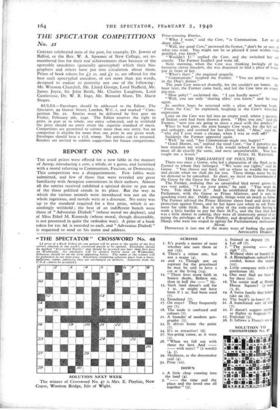REPORT ON NO. 19
THE usual prizes were offered for a new fable in the manner of Aesop, introducing a cow, a whale, or a goose, and furnished with a moral referring to Communism, Fascism, or Democracy. This competition was a disappointment. Few fables were submitted, and few of those that were revealed any great familiarity with Aesopian conventions in their authors. Almost all the entries received exhibited a spirited desire to put one of the three political creeds in its place. But the way in which the various animals were introduced was not on the whole ingenious, and morals were at a discount. No entry was up to the standard required for a first prize, which is ac- cordingly withheld ; the best of an indifferent bunch were those of " Advocatus Diaboli " (whose moral we deplore), and of Miss Ethel M. Kennedy (whose moral, though discernible, is not presented in quite the orthodox way). A prize of a book token for los. 6d. is awarded to each. and " Advocatus Diaboli " is requested to send us his name and address. Prize-winning Entries.
"What I want," said the Cow, "is Communism. Let us au share alike."
"Well, my good Cow," answered the farmer, "don't be so sure of what you want. You might not be so pleased if your wishes were gratified, you know."
"Wouldn't I! " replied the Cow, and she switched her tail crossly. The Farmer laughed and went off.
Next morning, when the Cow was thinking lovingly of her favourite clover meadow, she was disgusted to find a plate of bones put in front of her.
"What's that?" she inquired snappily.
"Communism," laughed the Farmer. "You are going to share in the Dog's dinner." The poor Cow moo-ed dismally, for she couldn't eat bones. An hour later, the Farmer came back, and led the Cow into an empty pig-stye.
How poky! " exclaimed she. "I can hardly move." "Well, you are only 'sharing alike,' you know," and he went again. In another hour, he returned with a plate of herring heads. "From the Cat," he explained, laughing at the Cow's wretched expression. Later on the Cow was led into an empty yard, where a quantity of Indian corn had been thrown down. "Here you are," said the Farmer, "now you are going to share a meal with the poultry." When he had gone, the poor hungry Cow wept, for she felt sad and unhappy, and yearned for her clover field. "Alas," said she, "why did I ever want a change, when I was so well off?" Suddenly the Farmer appeared again. "Well," he said, "has Communism made you happy?"
"Good Master, no," replied the tired Cow, "for I perceive now how mistaken. my wish was. Life would indeed be dismal if we must all do exactly the same, and most uncomfortable. You hare taught me a lesson." ' ETHEL M. KENNEDY.
THE PARLIAMENT OF POULTRY.
There was once ,a Goose, who led a deputation of the flock to the Farmer to whom they belonged. "We want our rights," said the Goose. "You choose our food, tell us where to waddle for water and decide when we shall die for you. These things must be, but we demand to be consulted. In short, we insist on Government of the Geese by the Geese for the Geese! "
The Farmer, realising that an unsatisfied bird never grows fat, was very polite. "I see your point," he said. "You want the Vote. You shall have it." And he established the first Poultry Parliament, with the Goose as Prime Minister, and it met for quacking every day. Oddly enough, things went on much as befog. The Fanner advised the Prime Minister about food and drink and protection against Foxes, and let her know just when to ask Parlia- ment for table birds. But in spite of the rank-and-file having to work a little harder to pay for their M.P.s, and the fact that food was a little slower in coming, they were all immensely proud of en- joying the privileges of a Free Poultry, and despised the Cows and Sheep, who were too stupid to agitate for Parliamentary institution
Moral.
Democracy is just one of the many ways of fooling the people Anvoc.nrus DIABOLL






































 Previous page
Previous page